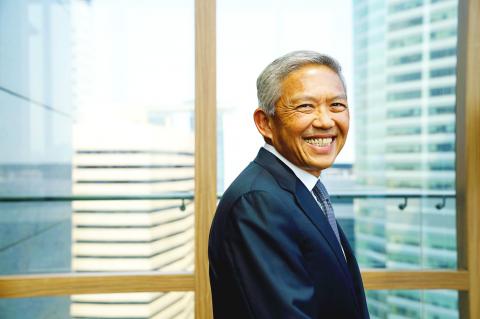Bank of Singapore Ltd (新加坡銀行), the private banking arm of Oversea-Chinese Banking Corp (OCBC, 華僑銀行), is looking to expand its family office business as the city-state rolls out the red carpet for wealthy investors.
“We are seeing increasing demand for families moving into the next generation to set a proper structure in place to manage family wealth,” chief executive officer Bahren Shaari said in an interview on Thursday. “Singapore is promoting that, to let families use it as a base to manage their investment activities globally.”
Bank of Singapore’s expansion would heighten competition with European firms such as UBS Group AG and Credit Suisse Group AG, who have long dominated this space.

Photo: Bloomberg
Singapore family offices had average assets under management of US$857 million last year, nearly double the Asia-Pacific average of US$445 million, according to a survey of 262 such offices in a UBS/Campden report.
The expansion is to be spearheaded by Lee Woon Shiu (李文修), a managing director who currently looks after Bank of Singapore’s wealth planning and trust solutions, Shaari said.
While the bank does not plan to substantially increase the number of relationship managers it employs from about 400 now, it aims to double assets under management to US$500 million per banker over the next three to four years, he told Bloomberg TV on Friday.
Bank of Singapore also plans to open a new Taiwan unit to tap OCBC’s onshore presence.
The expanded family office business in Singapore would especially focus on rich families from China, Europe, and the Middle East, who are looking to invest in the Southeast Asian nation.
The Singapore government provides incentives including tax exemptions for funds managed by family offices for both offshore and onshore vehicles.
That offers the advantage that the offices would not pay Singapore tax on most of its investment gains, Shaari said.
Bank of Singapore’s assets under management rose to US$100 billion last month, after increasing an average 21 percent each year over the past five years.
The bank ranked No. 7 among Asia’s largest private banks in 2016, data compiled by Asian Private Banker showed.
To help expand its wealth and family office business in Europe, Bank of Singapore hired Anthony Adriano Simcic this month from HSBC Private Bank in Luxembourg. Simcic is to remain in the European city, which would be used as a base in addition to London.

‘SWASTICAR’: Tesla CEO Elon Musk’s close association with Donald Trump has prompted opponents to brand him a ‘Nazi’ and resulted in a dramatic drop in sales Demonstrators descended on Tesla Inc dealerships across the US, and in Europe and Canada on Saturday to protest company chief Elon Musk, who has amassed extraordinary power as a top adviser to US President Donald Trump. Waving signs with messages such as “Musk is stealing our money” and “Reclaim our country,” the protests largely took place peacefully following fiery episodes of vandalism on Tesla vehicles, dealerships and other facilities in recent weeks that US officials have denounced as terrorism. Hundreds rallied on Saturday outside the Tesla dealership in Manhattan. Some blasted Musk, the world’s richest man, while others demanded the shuttering of his

Taiwan’s official purchasing managers’ index (PMI) last month rose 0.2 percentage points to 54.2, in a second consecutive month of expansion, thanks to front-loading demand intended to avoid potential US tariff hikes, the Chung-Hua Institution for Economic Research (CIER, 中華經濟研究院) said yesterday. While short-term demand appeared robust, uncertainties rose due to US President Donald Trump’s unpredictable trade policy, CIER president Lien Hsien-ming (連賢明) told a news conference in Taipei. Taiwan’s economy this year would be characterized by high-level fluctuations and the volatility would be wilder than most expect, Lien said Demand for electronics, particularly semiconductors, continues to benefit from US technology giants’ effort

ADVERSARIES: The new list includes 11 entities in China and one in Taiwan, which is a local branch of Chinese cloud computing firm Inspur Group The US added dozens of entities to a trade blacklist on Tuesday, the US Department of Commerce said, in part to disrupt Beijing’s artificial intelligence (AI) and advanced computing capabilities. The action affects 80 entities from countries including China, the United Arab Emirates and Iran, with the commerce department citing their “activities contrary to US national security and foreign policy.” Those added to the “entity list” are restricted from obtaining US items and technologies without government authorization. “We will not allow adversaries to exploit American technology to bolster their own militaries and threaten American lives,” US Secretary of Commerce Howard Lutnick said. The entities

Minister of Finance Chuang Tsui-yun (莊翠雲) yesterday told lawmakers that she “would not speculate,” but a “response plan” has been prepared in case Taiwan is targeted by US President Donald Trump’s reciprocal tariffs, which are to be announced on Wednesday next week. The Trump administration, including US Secretary of the Treasury Scott Bessent, has said that much of the proposed reciprocal tariffs would focus on the 15 countries that have the highest trade surpluses with the US. Bessent has referred to those countries as the “dirty 15,” but has not named them. Last year, Taiwan’s US$73.9 billion trade surplus with the US